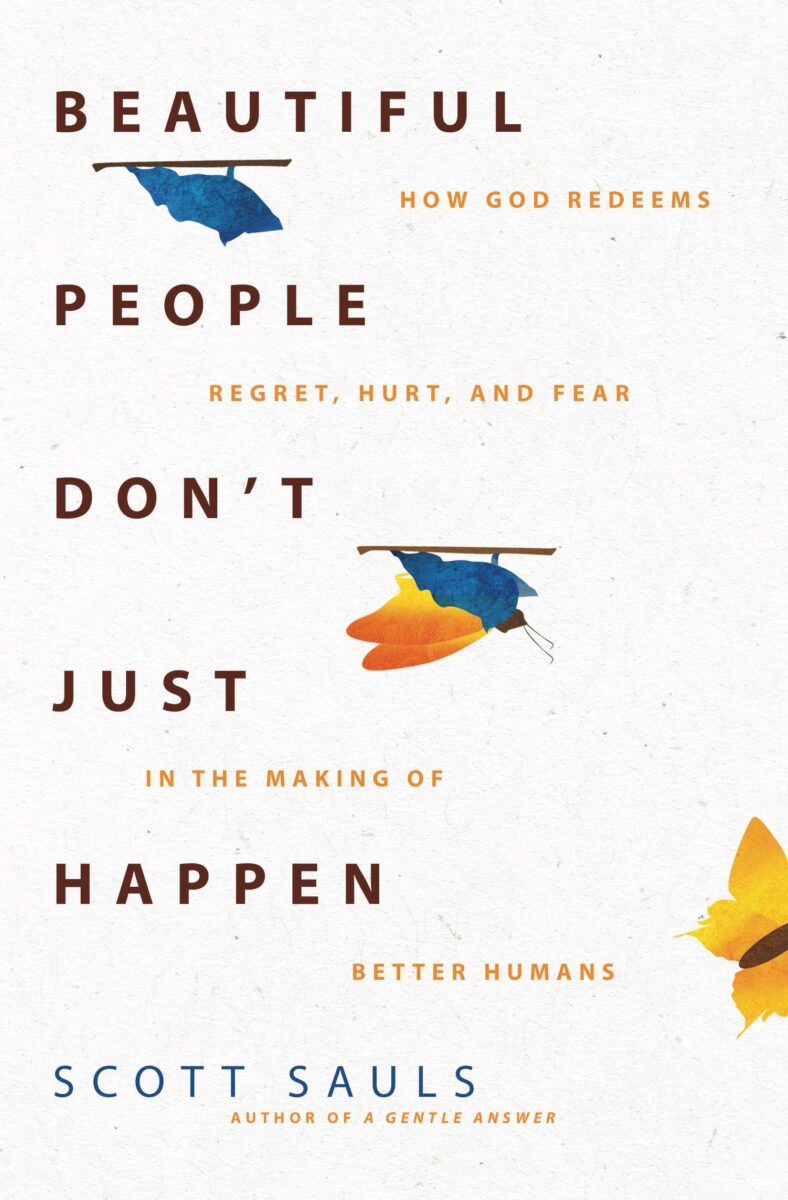Speaking Light Into Darkness: Kristoffer Polaha and Scott Sauls
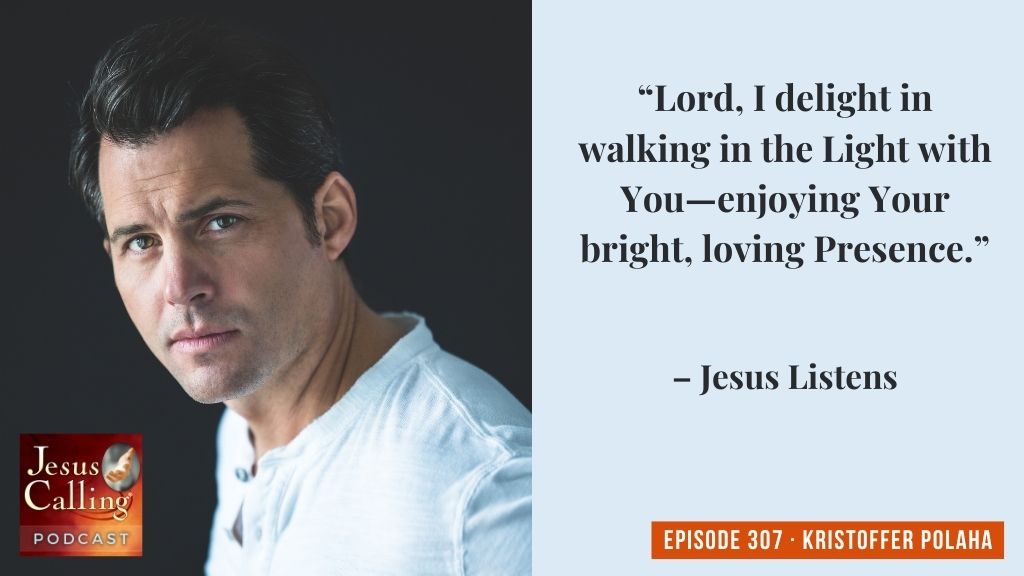
Kristoffer Polaha: I find myself gravitating to stories that are very much about speaking life into darkness, speaking light into darkness, and speaking life into the hearts of the people who are reading my stories or watching my movies.
Speaking Light Into Darkness: Kristoffer Polaha and Scott Sauls – Episode #307
Narrator: Welcome to the Jesus Calling Podcast. When Jesus set about gathering His disciples, He chose people from very different backgrounds. His disciples included fishermen, a tax collector, perhaps one of royal blood, and a revolutionary. Not only did they find a working commonality, they were united and transformed through their relationship with Jesus. After Jesus’ ascension, this same rag-tag twelve took the Good News that Jesus taught to the farthest reaches of the world.
Today’s guests, like Jesus’ disciples, have come from very different backgrounds and taken Jesus’ love and message to very different destinations. Kristoffer Polaha lives in Hollywood with his wife Julianne Morris and their three children, where he is an actor, producer, director, and writer. Scott Sauls is the senior pastor of Christ Presbyterian Church in Nashville, TN, where he and his wife Patti have two daughters. Scott has also written six books.
Let’s start things off with Kristoffer’s story.
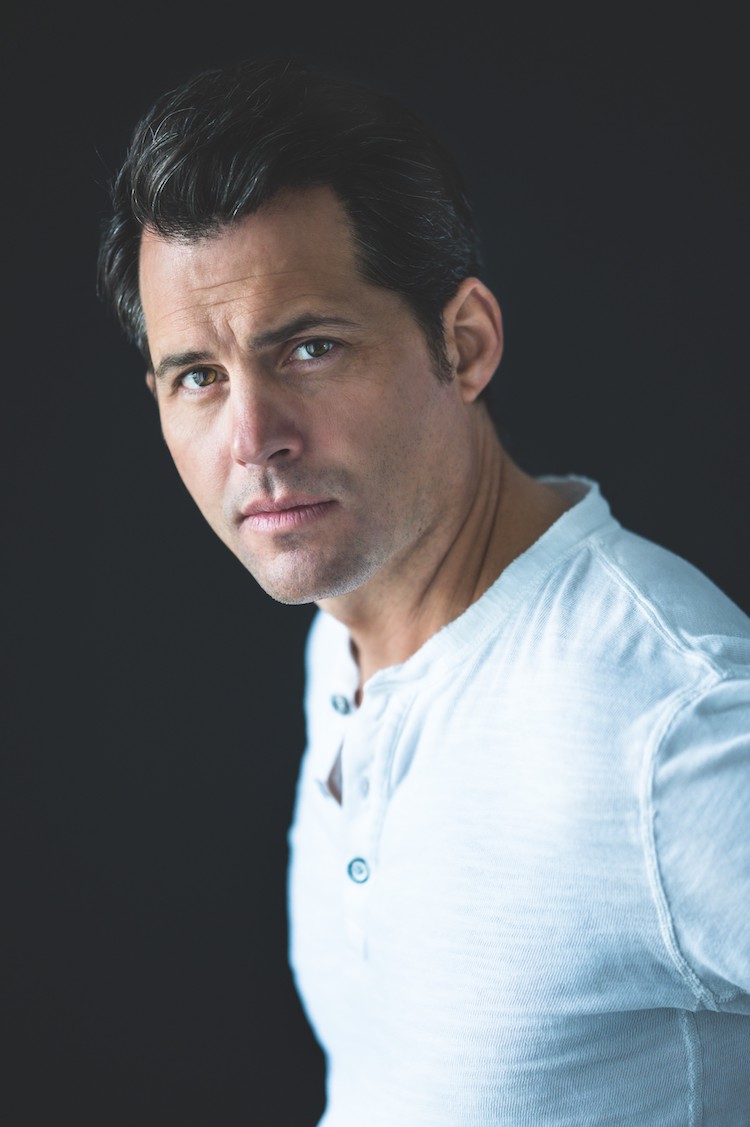
Kristoffer: My name is Kristoffer Polaha. I am a husband. I’m a father to three young men. I’m an actor. I am a producer, a director, and most recently, a writer of romance fiction.
I grew up in Reno, Nevada, the biggest little city in the world. My mom and dad were married and have been married my whole life. I have three older brothers, so I was one of four boys. We skied in the winter, and we went up to the lakes in the summer. I had a best friend named Graham growing up, and he used to play G.I. Joe and tennis and hang out. We had a ditch below his house, and we had a little rope swing that we’d swing over the ditch. It truly was like one of those cool childhoods.
Early on, as a kid, I always kind of had it in my mind, like, Well, maybe one day I’ll be an actor. My imagination used to run out in the same way that movies did. So I would see shots in my head, and then I would cut to another shot in my head. So my imagination, it was weird. It was like I was a boxer, but I was a boxer in a movie, or I was a soldier, but I was a soldier in the movie. So I was playing war, but I was playing war in a movie. So weirdly, movies have always been a part of my life. Acting has always been a part of the way that I communicate, the way that I like to tell my story.
So from Reno, I went to a place called Stevenson in Pebble Beach, California, and I left home around fourteen. This was my choice. Graham’s mother was raised in Rhode Island and had sort of an English mindset, and she was sending all her kids off to boarding school. I just thought that was the coolest thing, and I kind of convinced my parents to send me off to boarding school as well.
I got to school my freshman year, and it was the worst experience of my life. I was terribly homesick and would call my mom every single night from this pay phone that was off the cafeteria and be lit by this sort of deeply gold yellow light. And this fog from the peninsula would roll by. It was very dreary.
There was this kid who was bullying my roommate, and I remember praying to Jesus and being like, “Lord, I don’t know what to do about this kid,” because I was physically bigger than him. I could have just physically popped him and said, “Get out of here.” But there was this idea of being a Christian and turning the other cheek and trying to do it in the right way. And in December, when this all happened, instead of taking up my physical aggression on the kid, I took it out on the windows.
So then I went to the Dean of Students office, and I kind of told on myself, and he’s like, “Well, why did you do that?”
I didn’t want to say, “Well, there’s a bully, and I didn’t want to get him in trouble like that.” But I did say, “I just know I’m really frustrated, and I’m really having a hard time.”
And he said to me, “Well, let’s set some goals. Let’s set a GPA that you can hit, and let’s get you involved in an after-school activity.”
It was in that moment that I tried out for the school play, and I tried out for the freshman basketball team. I got cut from the basketball team even though I’m 6”1’. I was just really gangly and kind of uncoordinated. But I made the play, A Streetcar Named Desire. I was the only freshman cast. The rest of the cast were seniors who were deadly serious about the craft of acting. And it was this community that I instantly fell in love with and found my place, and I thrived in it. It became the thing that I did.
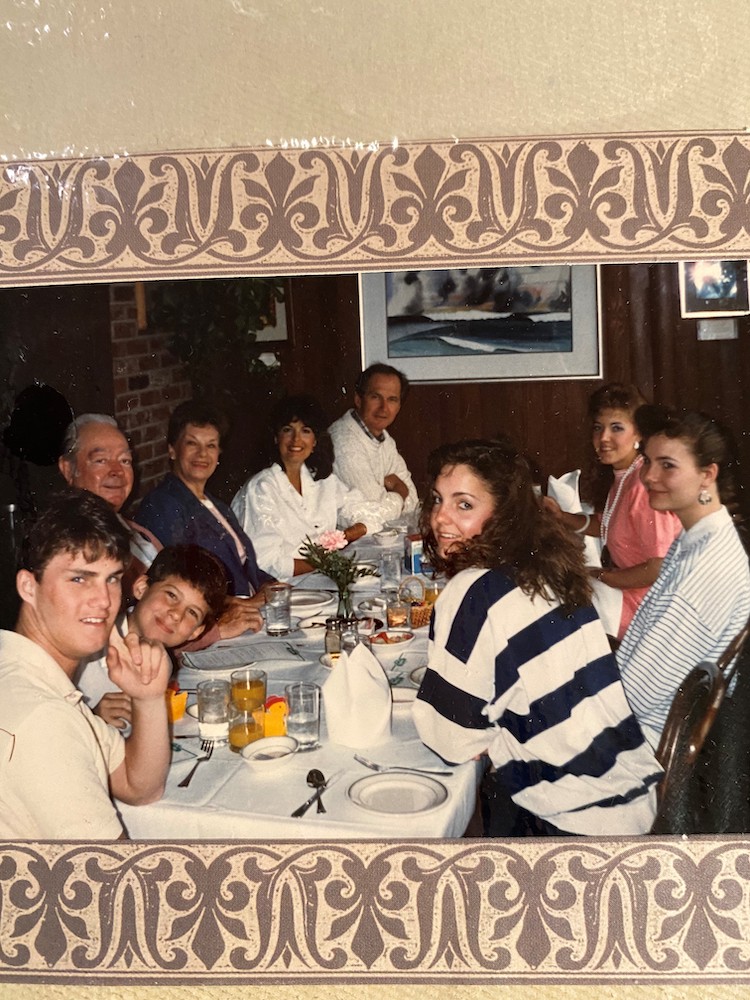
And then my junior year I remember really specifically praying, and Fall of that year was I guess maybe ‘93. I’m saying, “Lord, I want to know if this is You doing all these amazing things in my life or if this is me. I’m just going to take a break for six months. I’m just not going to pray for six months.” And it really was this prayer of pride and me kind of leaving my relationship for a minute with God, you know, because I wanted to see if all the great stuff was God or me, like was it His hands or my hands. And the six months turned into the six years.
I remember just kind of moving through those six years, and I did a semester at sea. I got into a boat, went around the world. One of the things I wanted to do was study world religion. The other was studying world theater.
I studied Shintoism and Buddhism and Confucianism and all of these different world religions, trying to get an understanding of God and religion and all this stuff. And it’s so funny because God put this guy, Ryan Johnson, in my room. He was my cabin bunker, my bunkmate, and he was like, “Dude”—he’s a Southern kid from Atlanta, Georgia—he’s like, “Man, you’re doing all this stuff around the world. Why don’t you just read the Bible, man?”
He had this Bible study, and I started going to this Bible study, and I think God was able to use and is able to use that little winter of my life, that six years of wilderness.
Answered Prayers in Times of Need
One time I was praying about this pilot, whether it was going to be picked up or not. And the story about how that show got picked up is so awesome.
We were on the schedule. It was a show called Miss Guided for ABC. We were on the schedule to be picked up Thursday night. Friday morning they took us off the schedule and that was their last day. They were announcing everything officially on Monday, but like that was it. Their schedule was locked on Friday, and we were no longer on the schedule. I just was sick to my stomach—I needed the job. I’d been a year and about eight months since I’d worked on a show, and I needed it. We had a mortgage and literally the house had gone into foreclosure. I mean, it was real, it was serious. We had our baby boy, and my wife was pregnant at that time with another one. And I was like, “God, I don’t know what’s going on, but You can do anything. And I’m asking that You provide for me, You offer provision through this thing.”
Excuse me?
Saturday came and went. Sunday, my wife had this terrible headache, and she’s like, “Will you pray?” And I started praying for her headache. And she’s like, “No, no, no, don’t pray for my head. Pray about the job.”
I started praying about the pilot. And as soon as I started praying, about three minutes into this prayer, the phone rang and it was the director, this guy named Todd Holland, who was not a Christian, and it was Ashton Kutcher’s show, Judy Greer was involved in it, like, this is a cool, fun thing. And he’s like, “You were the first call I’m making because I know how important this is to you, and I know how much you’ve been praying for us. And I just want you to know that I don’t know how, it’s kind of a miracle, but we are back on the schedule and they have picked up the show.” And Julianne and I started crying. We were just like, “Thank you, Lord.”
Giving Up Control and Looking to God
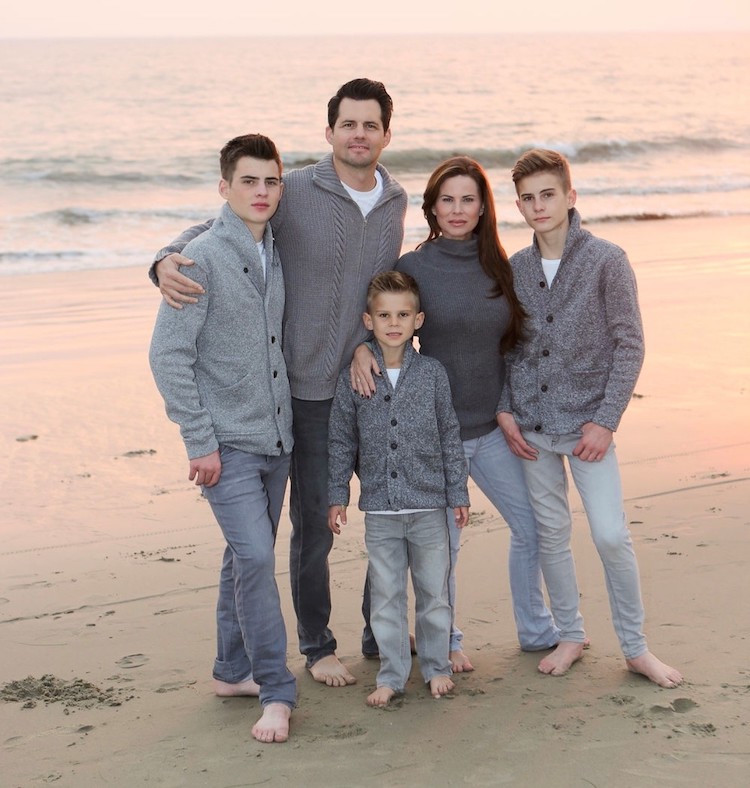
Julianne and my relationship have been this bedrock throughout this crazy career. We’re in Hollywood together, we’re still married, we’re still thriving and our kids are thriving. It is all God’s work. It’s all God’s handiwork. And there’s always been this sort of grace towards my faith because there’s just this joy that surrounds the career and the family, and there’s just something that’s working. God broke open my heart in 2015 and 2016, and He was just doing reconstruction on my heart.
If I’m going to remind people of anybody in my acting, instead of reminding people of Marlon Brando or instead of reminding people of Jimmy Stewart or some hero of mine, why don’t I try to remind people of Jesus? Why don’t I try to act in a way that people go, “You remind me of somebody. I don’t know who it is.” And how could that be if I sort of reminded people of Jesus through my work?
I had to just give my acting over. I had to literally just say, “God, it’s in your hands. If you want me to be an actor, you open up doors, and if you don’t, you will close them. I am no longer going to try to control this thing.” And I apologized for breaking up with Him all those years ago. I repented and I said, “Lord, I’m sorry.”
“I had to just give my acting over. I had to literally just say, ‘God, it’s in your hands. If you want me to be an actor, you open up doors, and if you don’t, you will close them. I am no longer going to try to control this thing.’” – Kristoffer Polaha
I had this—I called it my “holy road,” which was this hiking trail above our house in The Palisades. I would just fall to my hands and my knees, and I didn’t care who walked up that trail and saw me on the ground, but I would just cry out.
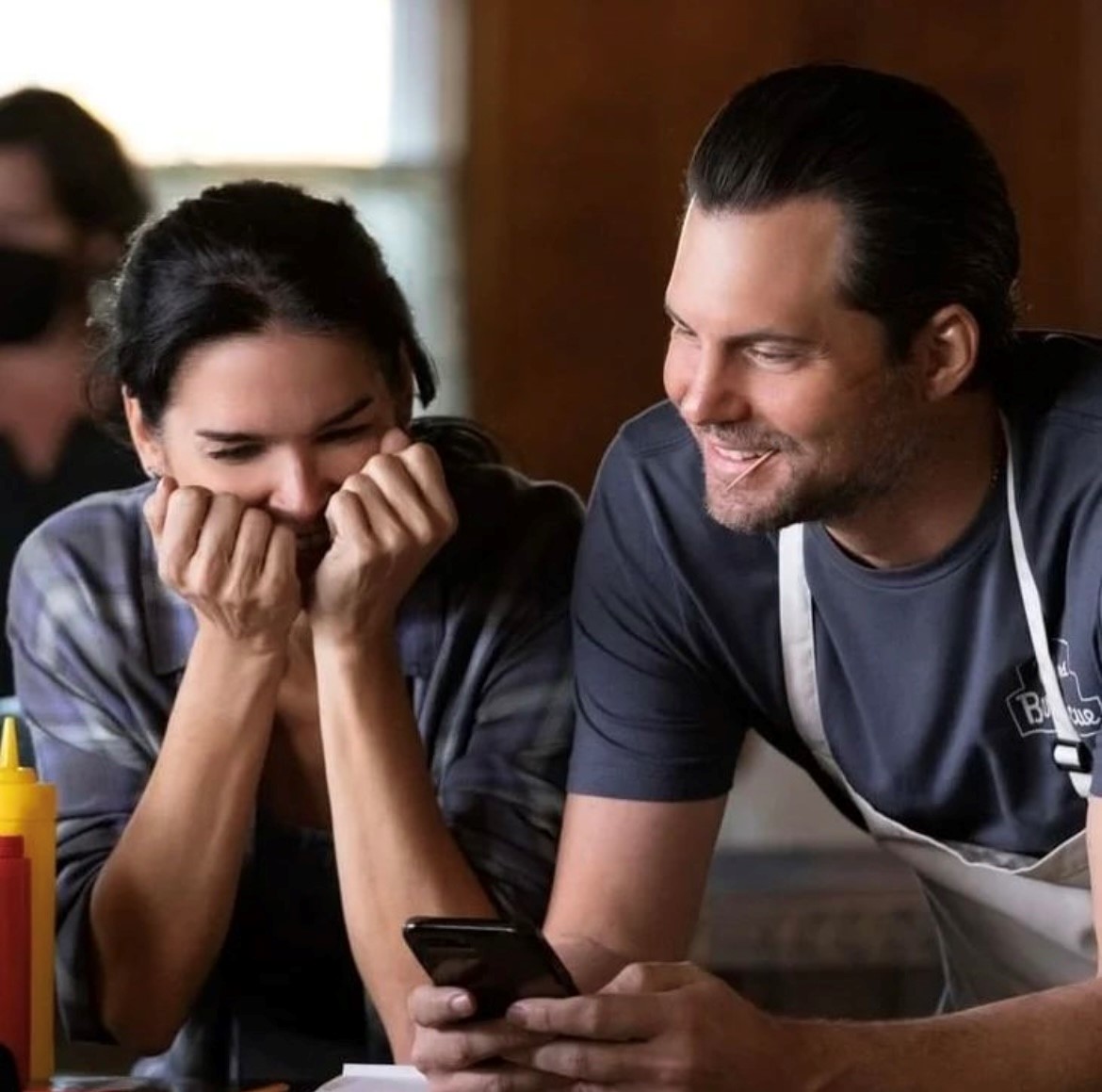
You know, as an actor, you only make money when you’re working. And so there’s this crazy ebb and flow of when I’m working and when I’m not—really, really lucrative periods of my life to really, really dry periods. And I always feel tethered to my faith in those moments because there’s literally nothing I can do other than pray and see God open up the door, open up something like, I need a job.
And what’s crazy is, I remember the first time I ever worked for Hallmark. I just cried out. I said, “Lord, I need a job.” And that afternoon my agent called and said, “Hey, you just got offered this thing.” And it was Dater’s Handbook. That kind of opened up this whole other chapter, and then the Dater’s Handbook led to Hallmark stuff, which then led to this writing, which then led to an offer in 2017 to be in Wonder Woman 1984. My roommate in college, Colin Trevorrow, led to an offer for Jurassic World: Dominion twenty-one years later. I mean, God has this way of making all things sort of work together for good, and being an actor tethers you to your faith in a way that I guess every profession might, but that there is no consistency. It really is out of my hands.
Staying Plugged into the Source of Peace
When you think about it for real, like genuinely, and if you believe there is a God in the universe who created the universe and everything in it, everything that is seen and unseen, and that the hairs on our head are numbered, then why wouldn’t you just want to constantly be in contact with that? Be constantly plugged into the source?
God has shown me things in my life, like, there have been real moments of need, and I would cry out to God and say, “Lord, I need this thing.” And God, there would be a feeling, an overwhelming feeling of peace that surpassed all understanding. It was almost as if God would say, “I’ve got you.”
Ultimately, God wants us in relationship. He says, “Love God and love each other.” It’s a relationship with God and a relationship with each other.
August 22nd, Jesus Listens:
Precious Jesus,
Help me to trust You in the midst of a messy day. I don’t want my inner calm—my Peace in Your Presence—to be shaken by what’s going on around me. Even though I live in a temporal world, I know that my innermost being is rooted and grounded in eternity. When I start to feel stressed, I need to detach myself from the disturbances around me. As I stop striving to maintain control, You enable me to relax in Your sovereign control—and receive Your Peace that transcends understanding.
Your Word instructs me to seek Your Presence continually! Please share Your mind with me and open my eyes to see things from Your perspective more and more. I love to hear You telling me: “Do not let your heart be troubled and do not be afraid. Take heart! I have overcome the world.” Lord, I rejoice that the Peace You give me is sufficient for all my circumstances!
In Your all-powerful Name,
Amen
Narrator: You can see Kristoffer in the film Jurassic World: Dominion, coming in the summer of 2022. To find out about Kristoffer’s other appearances in film and on TV, or to join his community of faith on Instagram, go to www.krispolaha.com for more information.
Stay tuned to Scott Saul’s story after a brief message.
When life is overwhelming, Jesus Listens
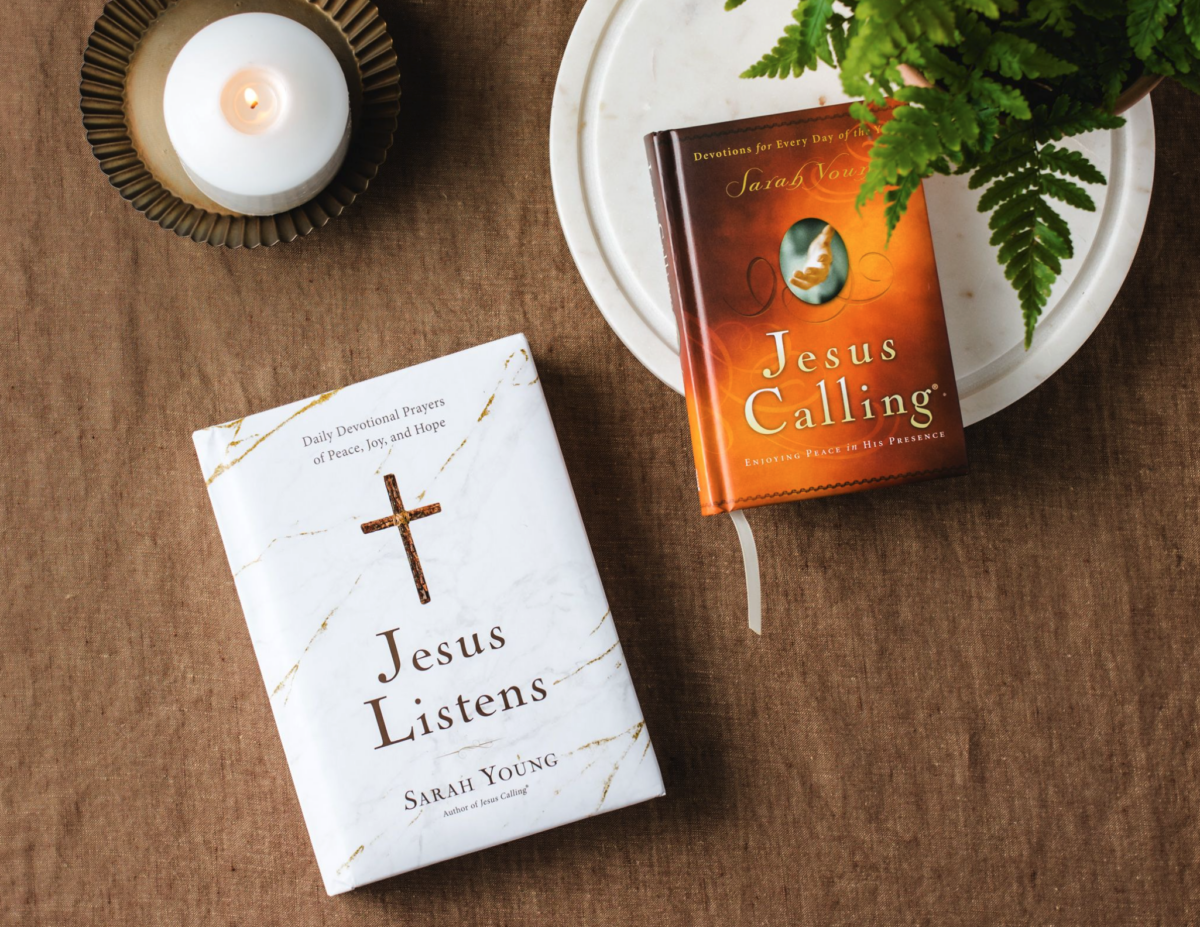
No matter what happens, God is always there, ready to hear your prayers. That’s why Sarah Young wrote the new book, Jesus Listens.
Jesus Listens is a 365-day prayer devotional with short, heartfelt prayers based on scripture, written to deepen your relationship with God and change your heart. Click here to learn more about Jesus Listens and download a free sample!
Narrator: Our next guest is Scott Sauls, a pastor who has openly talked about seasons of regret, hurt, and fear—including battles with anxiety and depression. He knows what it’s like to be unfinished and on the mend under Jesus’ merciful, mighty hand, and wants to show others how we can become more who we’re meant to be when we trust in God through the hard parts of life.
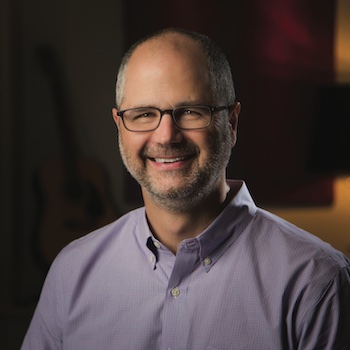
Scott Sauls: Hello Jesus Calling listeners. My name is Scott Sauls and I serve as senior pastor of Christ Presbyterian Church in Nashville, Tennessee. I have been serving here for about ten years, came here by way of Redeemer Presbyterian in New York City. And I also have the distinct honor and privilege and joy of being able to serve as pastor to Sarah Young and to several members of her extended family. And just grateful to be with you today on the podcast.
The Secret to Contentment
I believe that every person, especially in the season that we’re in right now, after the two years plus of being in a global pandemic and all of the unrest that we find ourselves in politically and people talking past each other on social media and so on, I feel like the three major pain points or what I believe are the three major pain points that the Bible points out are being felt perhaps more deeply than they ever have, at least in my lifetime, in our part of the world.
Those three pain points are regret or wishing that we could go back in time and redo some things or say some things differently or make decisions differently than we did. So the regrets that we live with, the hurts that we live with—either the hurts that we’ve caused ourselves through those bad decisions or hurts that have been imposed upon us by others who have sinned against us, or just by virtue of living in a world that’s fallen. And that includes hard things. And then, of course, the third pain point would be fear. And I think we’re all struggling at some point with anxiety about what the future holds.
We become more and more the people that God has created us to be through the crucible of hard things. Almost every book of the Bible was written by somebody who was a slave in prison, under severe persecution, awaiting their own death. Almost the whole Bible was written by people who were going through that level of distress. And Paul the Apostle is no exception to that. In fact, he writes his letter to the Philippians while incarcerated, he writes it from prison. He says, “I’ve learned the secret of being content in every situation, whether living in plenty or in want.”
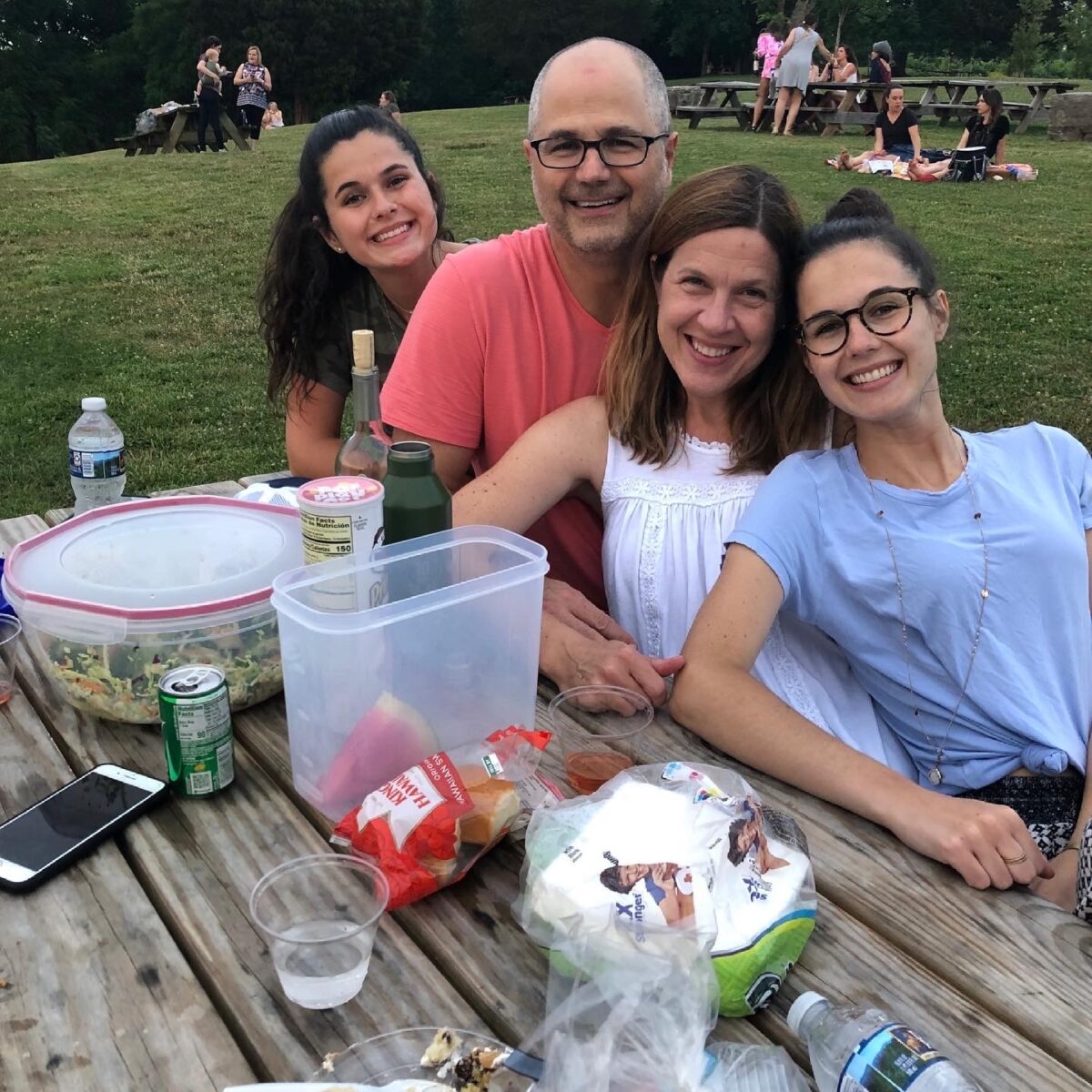
Now, one of the things that we easily miss or we easily brush by from that statement is that Paul doesn’t just say he’s learned the secret of being content when he’s in want when things are going badly. You can’t take contentment for granted based on your circumstances. In fact, the circumstances that we’re in have nothing to do with our level of contentment. There are a lot of people whose circumstances are great and they’re miserable, and there are a lot of people who are suffering deeply and they are filled with joy. And so Paul says the secret in every situation to being content is, “I can do all things through Christ who gives me strength.” [Philippians 4:13]
“We become more and more the people that God has created us to be through the crucible of hard things…You can’t take contentment for granted based on your circumstances.” – Scott Sauls
And to use the book title, Jesus Calling, Jesus is calling us to find our contentment in Him and in Him alone. And He has every resource in Himself to give us, to supply that contentment for us that we can’t seem to define anywhere else. And that doesn’t last anywhere else except in Christ.
What are some words that we can use to talk to ourselves or put differently, to preach miniature sermons to ourselves when we are weighed down by things like guilt or hurt or fear? I think Paul the Apostle again gives us the answer to that question when he talks about how we can demolish what he calls strongholds by taking every thought captive, to make it obedient to Christ.
I was dealing with anxiety and just a lot of worry and fear about what the future might hold. And an older Christian gentleman in my life said, “Scott, you need to learn to talk to yourself more than you listen to yourself.” In other words, you need a strategy to help you turn the volume up on what God says and to turn the volume down on what your panicking, worried imagination is saying about future worst case scenarios. And I think this principle, talking to ourselves more than we listen to ourselves, we’re taking every thought captive to make it obedient to Christ means no more and no less than becoming so familiar with the Scriptures, especially what the Scriptures say and how the Scriptures speak into our regrets.
And so I think really it’s just a matter of of becoming so deeply familiar with the person and work of Jesus by deeply internalizing the gospels and candidly, deeply internalizing really helpful secondary sources like Jesus Calling which speak in a voice that so resonates with who Jesus is and what Jesus is like. And so familiarize ourselves also and especially with those verses in Scripture, in those sections of Scripture that address our unhealthy and or untrue thoughts. And of course, it’s always helpful to surround ourselves with friends and counselors and so on who can remind us of these things, what we’re meant to wrestle in community and not strictly in isolation. So that’s an important thing, too, is to get around other Christians who can affirm and help us believe and hold our arms up to the things that are true.
Lament: Permission to Express Your Sorrows
Romans 8 talks about how all of creation is groaning in eager expectation and anticipation of what Romans 8 also calls the glorious freedom of the children of God. And that’s a promise that Paul also talks about in the face of many, many hardships that he’s enduring, that he writes about in 2 Corinthians 4, where he talks about being beaten down, imprisoned, rejected, despised. Nothing seems to be working out circumstantially in Paul’s life. And yet he looks at those hardships and calls them light and momentary, which is kind of staggering, if you think about it, because the suffering he describes is severe from our perspective. And yet he says these light and momentary afflictions are just that when they are put up against and compared to the weight of glory that awaits us.
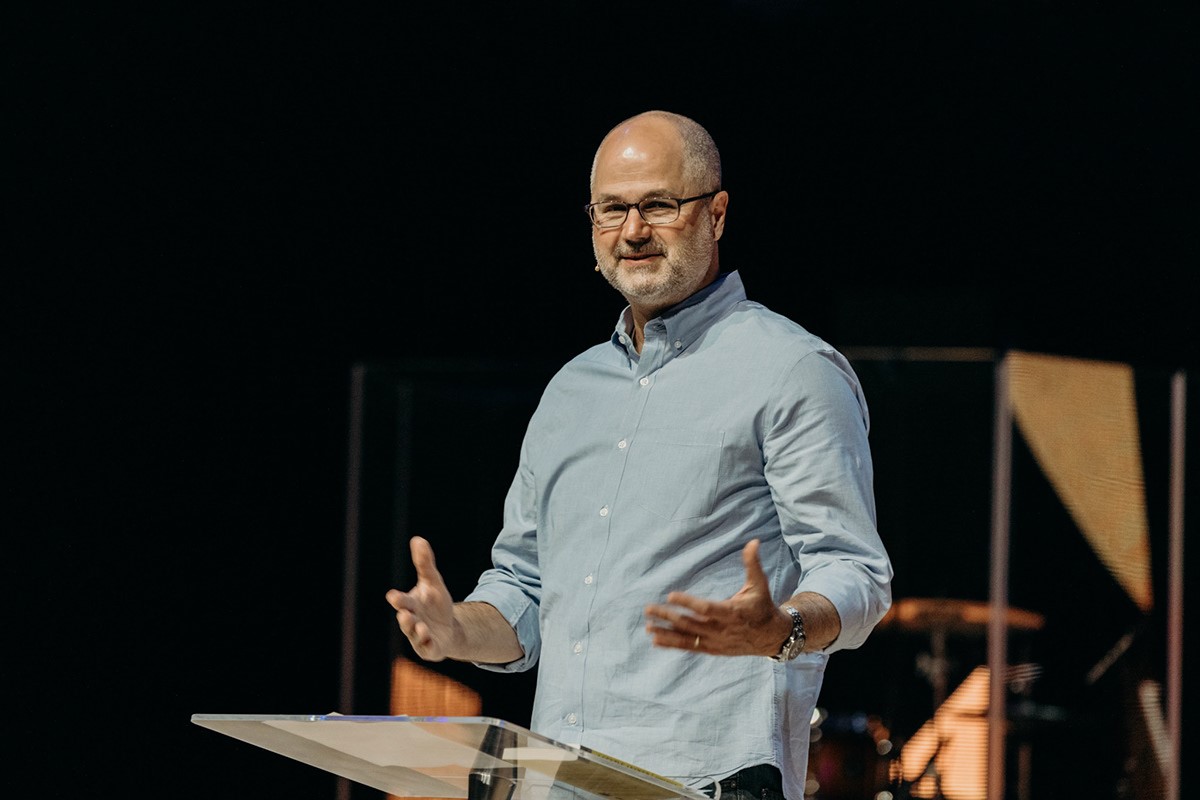
So the practice of lament is something that the Bible both exemplifies for us and encourages. And the way I like to frame the conversation about lament is that God has given us what another writer named Chip Dodd has identified as the eight-core emotions. And we see all of these emotions played out in very amplified, transparent, vulnerable ways, especially in the Psalms. And those emotions, if they were to all be given a name, seven of them are emotions that we would associate with distress, the emotions of guilt, shame, sadness, hurt, fear, anger, and loneliness. And then the eighth emotion is the one and only emotion that we would associate with happiness or positivity or optimism. And that’s the emotion of gladness.
To me, it’s very telling that God would give so many options to respond to in our distress, whether our distress is related to regret, hurt, fear, or some other form of distress. And those emotions are given to us by God to be used and to be activated in the same way that we’re supposed to use our fingers or our voices or our eyeballs. We are supposed to use our emotions as part of the stewardship of the lives that we’ve been given by God.
And so I think the conversation around lament is a conversation that is especially unwelcome in a Western American context. You know, whenever we hear somebody say, “Well, he’s so emotional,” or “She’s so emotional,” generally we hear that and receive that as a criticism, that we need to restrain our emotions. So we need to hold them in, that we need to keep a stiff upper left lip, whereas the way that the Bible portrays the use of emotion is the way we live them out loud. But the question is, are we expressing our lament? Are we expressing our sorrows and our hurts and our fears in a way that’s healthy and life-giving or in a way that’s destructive?
“We are supposed to use our emotions as part of the stewardship of the lives that we’ve been given by God.” – Scott Sauls
The people that I look up to the most and admire the most, my mentors and my teachers, almost always—if not always,—they have been through seasons of regret or hurt or fear or some other form of hardship or distress, and have been shaped and formed by God in those seasons.
I used to pray a lot about outcomes, especially temporal outcomes. You know, pray for healing, pray for open doors of opportunity, pray for finances to cover this one or this need. And those are all still prayers that I pray. Those are all still very legitimate prayers to pray. But I find myself minoring now on the prayers that I used to major in where I was asking for stuff. I find myself minoring on those kinds of prayers and majoring now on prayers about who God is and how the secret of contentment can be found in any and every circumstance and in any and every outcome.
“The secret of contentment can be found in any and every circumstance and in any and every outcome.” – Scott Sauls
Narrator: You can find Pastor Sauls’ book Beautiful People Don’t Just Happen: How God Redeems Regret, Hurt and Fear in the Making of Better Humans everywhere books are sold.
If you’d like to hear more stories about battling darkness with light, check out our interview with Jason Sautel on the Jesus Calling YouTube channel.
Next week: Anthony Ray Hinton
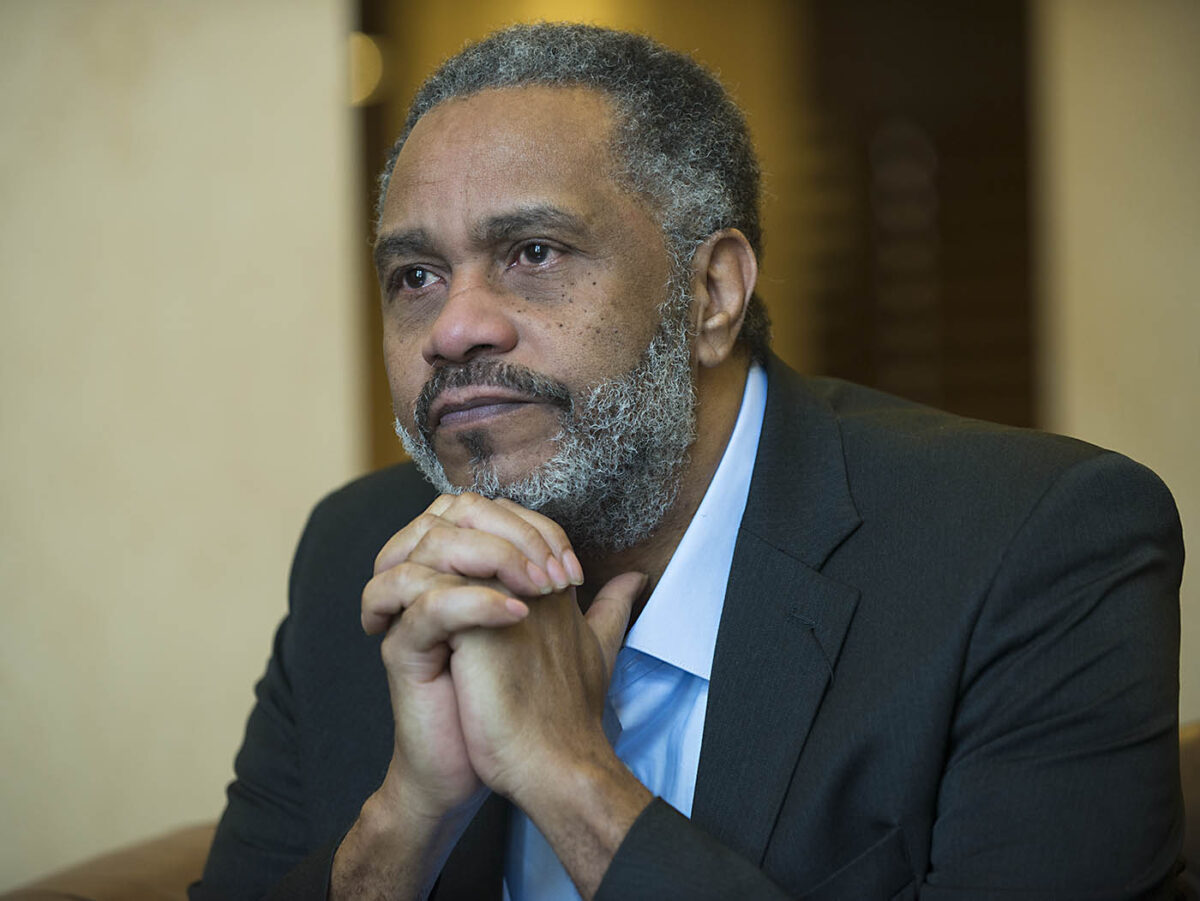
Narrator: Next time on the Jesus Calling Podcast, join us as we honor Juneteenth with Anthony Ray Hinton, a man who was wrongly convicted of two murders and held on death row for twenty-eight years. After the Supreme Court overturned his conviction and the state dropped all charges, Anthony walked away a free man in 2015—ready to put the wrongful things he’d suffered through behind him.
Anthony Ray Hinton: I love the fact that every night I go to sleep, my head is clean. I love the fact that He gave me a forgiving heart. I want people to realize that forgiveness is not a sign of weakness, but forgiveness is a sign of strength.
